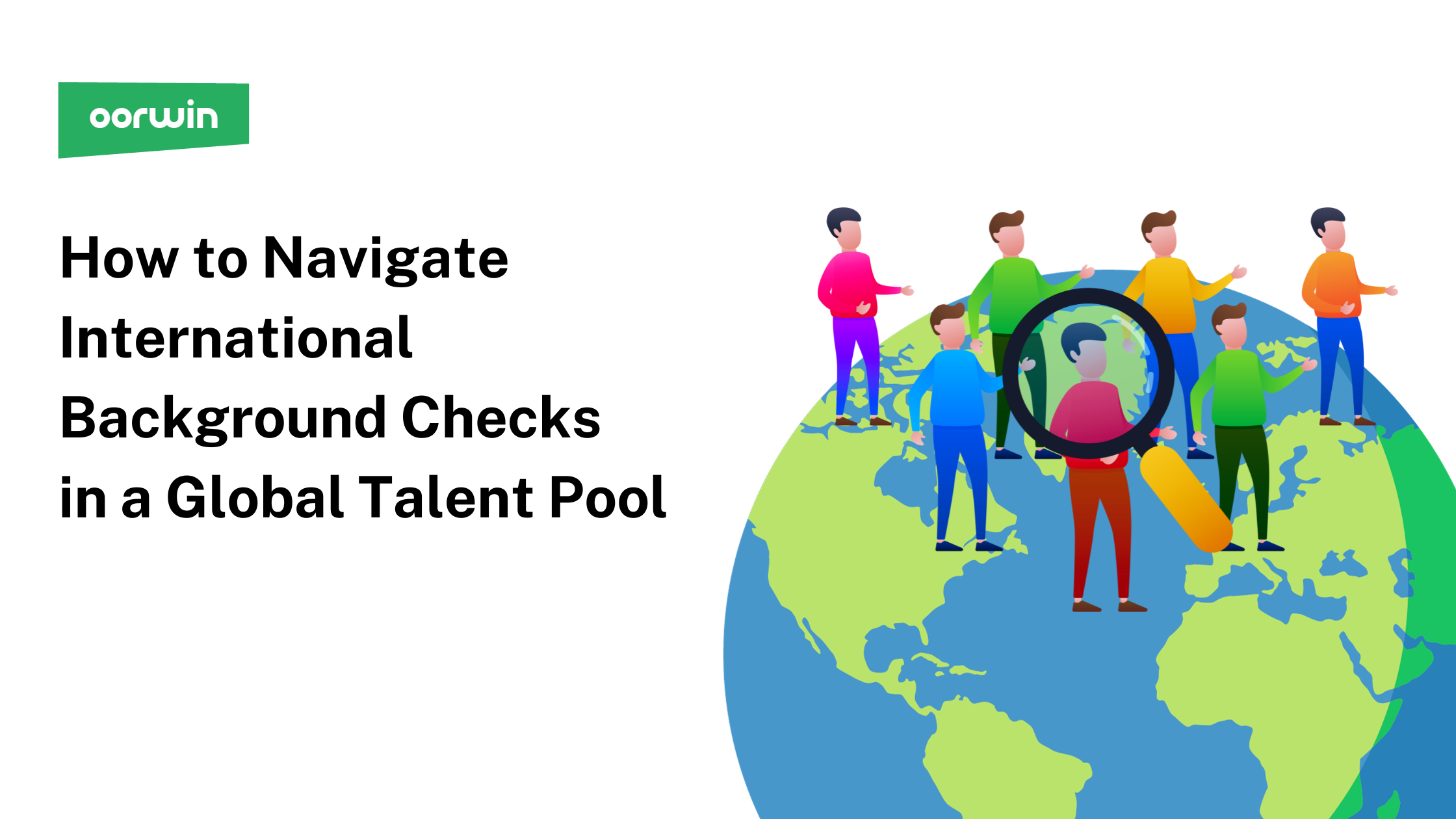Exploring International Background Checks in 2024
Oorwin
4min read / 5 Oct 2023

Related Articles
How to Navigate International Background Checks
International background checks have become an essential component of today’s globalized world. Whether you’re a business looking to hire international talent or an individual engaging in international business transactions, understanding and successfully navigating the complexities of international background checks is crucial. Nevertheless, we’ll walk you through the basics, challenges, and solutions of international background checks and provide a step-by-step guide on conducting them effectively.
Understanding the Basics of International Background Checks
International background checks involve examining an individual’s or organization’s history, criminal record, and qualifications in a foreign country. These checks are essential for making informed decisions in diverse contexts, from employment and immigration to international business transactions. The process typically involves scrutinizing criminal records, employment history, financial background, etc. It’s a critical tool for evaluating an entity’s integrity and suitability. These checks, however, are subject to unique legal and regulatory frameworks, data availability disparities, and cultural considerations, making them a complex endeavor. To navigate this complexity effectively, one must understand the fundamental principles of international background checks.
Navigating the Complexities and Solutions of International Background Checks
International background checks involve unraveling a web of complexities while seeking practical solutions. From diverse legal frameworks to varying data reliability and cultural considerations, these intricacies demand adept handling. This concise guide explores the challenges and offers insights into successfully conducting international background verifications in a globalized world.
Diverse Legal and Regulatory Landscapes
International background checks are intricately woven into each country’s legal and regulatory tapestries. The rules governing background checks vary widely, impacting what information is accessible, who can access it, and how it can be used. This diversity poses challenges in compliance and information accuracy. To navigate this, one must meticulously research and comprehend the specific legal requirements of the target country, ensuring that the process adheres to local laws and regulations. An awareness of these diverse legal landscapes is vital to avoid potential legal complications and ethical quandaries.
Data Availability and Verification
The availability and reliability of data for international background checks fluctuate significantly between countries. Some nations maintain extensive and easily accessible records, while others may lack centralized or reliable data sources. This discrepancy in data quality can pose a considerable challenge, often requiring thorough verification to ensure accuracy. Utilizing various sources, cross-referencing data, and employing professional services can help mitigate these issues. Given the varying data landscapes worldwide, data availability and verification demands a reasonable balance between thoroughness and adaptability.
Cultural Considerations and Language Barriers
Conducting international background checks necessitates a keen understanding of cultural norms, traditions, and language barriers specific to the target country. Cultural nuances can significantly impact the interpretation of information obtained, making it crucial to comprehend the local context. Language barriers further complicate the process, as they may lead to miscommunications or misinterpretations. Overcoming these challenges requires cultural sensitivity, potentially the assistance of local experts or translators, and an ability to adapt the process to align with the cultural and linguistic intricacies of the region. Successfully addressing these considerations ensures the accuracy and relevance of the background check results.
How to Conduct International Background Checks
Conducting international background checks demands precision. Explore the following steps for a brief roadmap on gathering essential information and making informed decisions on a global scale.
Deciding the Type of Background Check You Need
Defining your specific information requirements is imperative before embarking on international background checks. Different situations demand varying levels of scrutiny, such as criminal history checks, employment history verification, or financial background assessments. Tailoring the scope of the investigation ensures that you gather pertinent data, facilitating well-informed decisions.
Get an Overview of the Country’s Laws
Understanding the legal framework in your target country is of utmost importance. Research and familiarize yourself with the specific legal requirements and restrictions governing background checks within that jurisdiction. This comprehension is essential to avoid legal complications, ensuring your process aligns with local regulations and helping you comply with the law.
Obtain Authorization
In numerous countries, obtaining explicit consent from individuals or organizations is mandatory before a background check is initiated. Acquiring this vital authorization is not merely a legal prerequisite but also an ethical imperative. It prevents potential issues and concerns, ensuring the background check is conducted respectfully and lawfully.
Use Technology and Tools
Leveraging technology and specialized tools can expedite and enhance the efficiency of the background check process. Employ online databases, third-party screening services, and language translation software to streamline the acquisition and analysis of information. These tools significantly facilitate the intricate task of international background checks, saving time and effort.
Wrapping Up
International background checks are complex but necessary to make informed decisions in today’s global environment. By understanding the basics, being aware of the challenges, and following the steps outlined here, you can navigate international background checks effectively, ensuring your choices are well-informed and compliant with the laws and regulations of the respective countries involved. Whether hiring employees, forming partnerships, or engaging in international business, conducting background checks is vital in mitigating risks and making sound decisions.
Frequently Asked Questions
How to Do an International Background Check?
Conducting an international background check involves hiring a global background screening company, providing candidate consent, and navigating various international data privacy regulations.
Are Background Check Laws the Same in Every Country?
Background check laws vary by country and are not the same everywhere. They are influenced by local regulations, making them distinct in different nations.
How Can I Ensure Compliance With Foreign Background Check Laws?
To ensure compliance with foreign background check laws, consult with legal experts, obtain candidate consent, adhere to data protection regulations, and work with experienced global background screening providers.
Popular Articles..
Blog

10min read / 25-Jun-2025
Master Effective Interview Techniques with Oorwin: A Step-by-Step Recruiter’s Guide
Blog
Blog
Get the latest Oorwin releases, updates, success stories & industry news
 Back
Back
